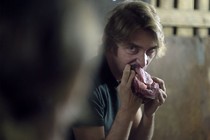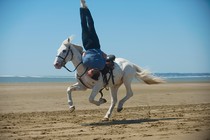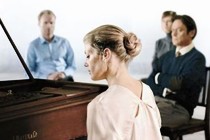Tomorrow at Dawn
- Perilous journey into the parallel world of historical reconstruction fans in this psychologically subtle and visually stunning film unveiled at the Cannes Film Festival
There was a hint of Barry Lyndon in the air last May at the screening of Denis Dercourt’s subtle Tomorrow at Dawn [+see also:
trailer
interview: Denis Dercourt
film profile], presented in official selection at the Cannes Film Festival, in the Un Certain Regard section, which screened the director’s previous work, The Page Turner [+see also:
film review
trailer
interview: Denis Dercourt
interview: Michel Saint-Jean
film profile], in 2006.
Indeed, the original director, who still practises his other profession of violin teacher, sets his story in the astonishing world of fans of historical reconstructions, in this case the Napoleonic army period. This backdrop becomes a dangerous spiral for two brothers.
Co-written by the director and Jacques Sotty, the plot opens with the return to the family home of Mathieu (an understated and remarkable Vincent Perez), a famous pianist in the midst of an existential and marital crisis, whose mother has to be admitted to hospital for chemotherapy.
The older brother comes to keep his younger sibling, the overly sensitive Paul (solidly performed by Jérémie Renier), company. The latter, a blue-collar worker, is totally enthralled by historical role-play, throwing himself into it as if it were a real-life situation and trying to share his passion with his brother.
Out of brotherly love, Mathieu agrees to join in the experience, but gradually realises that, beneath the disguise, lies a sort of fanatical sect, whose followers’ convictions go dangerously beyond the forest and increasingly realistic military reconstructions.
The musician, nicknamed "Far from the bullets" (for a pianist, "struts about, but isn’t much use on the battlefield") initially gets caught up in the game, before realising that he can’t cope any longer and has to fight for his honour, but above all his life and that of those close to him.
Plunging viewers into impressive period reconstructions, perfectly complemented by the protagonists’ naturalness, from bivouacs and duels in secluded natural surroundings, to a sumptuous candlelit dinner at which the "Emperor’s brave soldiers" recount their exploits to the ladies and provoke their comrades in arms, Tomorrow at Dawn confirms Dercourt’s talent and fluid directorial style.
Marrying apparent simplicity with an accomplished command of lighting, camera movements and rhythm, the director offers an elegant and intriguing thriller-like film, which demonstrates a certain perceptiveness in its treatment of human relationships (brotherly bonds, maternal illness, problems experienced by a couple, pupil-teacher relations), whilst negotiating the musical dimension with great ease (on screen and off). This talented combination belongs to an all-round artist, who prefers restrained tension and stylistic subtlety to ostentatious display.
Produced by Diaphana, Tomorrow at Dawn was co-produced by France 3 Cinéma, received an advance on receipts from the National Film Centre (CNC) and was pre-bought by TPS and Ciné Cinéma. International sales are being handled by Films Distribution.
(Translated from French)
Did you enjoy reading this article? Please subscribe to our newsletter to receive more stories like this directly in your inbox.



















